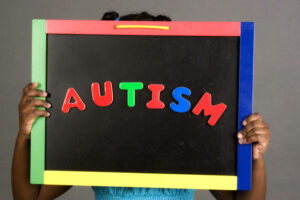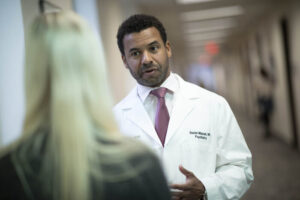In great need of in-person supports, developmentally disabled are overlooked in pandemic-related decisions, experts say
News
Pandemic Parenting Turned Me Into a Bad Mom (Links to an external site)
Right now, there’s no end in sight, either.
African American children with autism experience long delays in diagnosis (Links to an external site)

Such delays lead to serious disparities in access to developmental therapy
Schizophrenia, other psychotic disorders focus of new clinic for teens, young adults (Links to an external site)

The first signs of mental illness involving psychosis — the experience of having hallucinations, delusions or intrusive, disturbing thoughts — often appear during the teen years. Washington University School of Medicine in St. Louis has opened a clinic to provide treatment free of charge to adolescents and young adults who may be in the early stages of psychosis.
Davis, Luby receive 2020 faculty achievement awards (Links to an external site)
Joan Luby, MD, director of the School of Medicine’s Early Emotional Development Program and the Samuel and Mae S. Ludwig Professor of Child Psychiatry, will receive the Carl and Gerty Cori Faculty Achievement Award, Chancellor Andrew Martin announced.
Parenting during a pandemic (Links to an external site)
From coping with the boredom of being at home for days on end to grappling with fear and uncertainty, there are challenges for parents and children alike.
Psychological trauma is the next crisis for coronavirus health workers (Links to an external site)
Health care workers are risking their own health, witnessing higher rates of death and experiencing breakdowns of protocol and support.
Potential biomarker for autism identified in infants (Links to an external site)
A biomarker in newborns may signal autism spectrum disorder months or even years before troubling symptoms develop and such diagnoses typically are made, according to researchers at the School of Medicine and Stanford University.
Nature vs. nurture Studying adversity’s effects on children’s brains (Links to an external site)
Dr. Joan Luby and her colleagues have linked adversity, including poverty and neglect in the first years of life, to changes in brain anatomy. These changes increase the risk of learning difficulties, clinical depression and behavioral problems that affect a child’s well-being.
Brain imaging of babies with Down syndrome focus of $11.5 million grant (Links to an external site)
School of Medicine leading multicenter study aimed at understanding brain development in babies with the condition
Stable home lives improve prospects for preemies (Links to an external site)
Medical challenges at birth less important than stressful home life in predicting future psychiatric health
$9.5 million aimed at detecting autism earlier in childhood (Links to an external site)
Multicenter grant funds infant brain imaging at Washington University and other centers
Metcalfe gift supports study of adversity’s effects on children’s brains (Links to an external site)
Work will aid effort to understand role of nature versus nurture
Creative workshops help kids relieve stress with art (Links to an external site)
Glowinski, artist Outlaw address mental health through artwork
Dr. Rogers to be Honored at Salute to Excellence in Healthcare (Links to an external site)
On 4/26, she will receive the Dr. John M. Anderson Excellence in Mental Health Award for her work in promoting positive social and emotional development of babies in the region.
Doctors address mental health crisis among Rohingya refugees (Links to an external site)
Fleeing violence in Myanmar, refugees who are unsure of future settle in Bangladeshi camps
Mobile phone technology to screen, help treat college students (Links to an external site)
Phone app targets depression, anxiety, eating disorders
SLCH Launching New Inpatient Unit
St. Louis Children’s Hospital is launching a new 14-bed inpatient unit, for which an active search is underway for leadership of the new unit.
Parenting in the Internet Age (Links to an external site)
Starting on page 26, Dr. Eric Spiegel offers advice on making a plan for screen time at home.
Why genetic tests matter for autistic people (Links to an external site)
Genetic tests for people with autism are far from routine and don’t always yield results, but the information they offer can change lives.
Growing up transgender (Links to an external site)
The Washington University Transgender Center helps families navigate the complex world of gender identity
Effective Alternatives to Spanking (Links to an external site)
Dr. Neha Navsaria discusses child brain development and effective strategies to modifying child behavior.
New child maltreatment research center launched with $6.5 million NIH grant (Links to an external site)
Melissa Jonson-Reid, the Ralph and Muriel Pumphrey Professor of Social Work Research at the Brown School, and her team, including faculty from several disciplines across Washington University in St. Louis and Saint Louis University, have received a five-year, $6,496,050 grant from the National Institutes of Health (NIH) to create The Center for Innovation in Child Maltreatment Policy Research and Training (CICM).
Does Social Media Drive Depression? (Links to an external site)
Dr. Eric Spiegel offers advice on cell phone usage for children.
Perfectionism in young children may indicate OCD risk (Links to an external site)
Study involving behavior, brain scans may help ID issues early in life
Rates of autism continue to rise, new data indicate (Links to an external site)
New statistics indicate rates of autism in children have continued to increase. However, the rates have increased only modestly, suggesting there may be a leveling off.
Dr. Constantino Interviewed on St. Louis on the Air (Links to an external site)
Recent findings in autism and the impact on future research
2018 Distinguished Faculty (Links to an external site)
Dr. Dehra Harris received a Samuel R. Goldstein Leadership Award in Medical Student Education
Excessive Screen Time for Kids and New Recommendations (Links to an external site)
Dr. Eric Spiegel on SLCH’s Radio Rounds discusses strategies for managing children’s screen time.
Mental health support in the newborn nursery (Links to an external site)
Drs. Rogers and Constantino examine the importance of parental mental health screening in response to recent tragedy.
Five hot topics in autism research in 2017 (Links to an external site)
An overview of current themes emerging in autism research
Notable 2017 Findings in Autism Research (Links to an external site)
Some of the past year’s most significant discoveries in autism research, many of which were WU-led or faculty collaborated on.
Brain networks that help babies learn to walk ID’d (Links to an external site)
Scientists have identified brain networks involved in a baby’s learning to walk — a discovery that eventually may help predict whether infants are at risk for autism.
The findings build on previous research that has shown that babies who have delays in developing skills involved in coordination and movement are more likely to be diagnosed subsequently with autism spectrum disorder.
Brain Development and Anxiety Disorders (Links to an external site)
Drs. Rogers and Sylvester appear on the Pulse of St. Louis to discuss the implications of recent research on child brain development.
2016-2017 Distinguished Service Teaching Awards (Links to an external site)
Drs. Anne Glowinski, Dehra Harris, and Celina Jacobi were recognized in an October 24th ceremony for their dedication and service in training new physicians.
Discussing Halloween Safety With Your Kids (Links to an external site)
Dr. Eric Spiegel shares tips on how to discuss Halloween safety with your kids.
How to Talk to Kids about Impulsivity & ADHD (Links to an external site)
Dr. Dehra Harris is interviewed on How to Talk to Kids About Anything, a podcast hosted by Dr. Robyn Silverman.
How to talk to kids about ’13 Reasons Why,’ suicide and terrorist attacks (Links to an external site)
St. Louis Post-Dispatch columnist Aisha Sultan and KMOX radio host Debbie Monterrey talk with Dr. Eric Spiegel, director of child psychiatry at St. Louis Children’s Hospital, about how to talk about the most sensitive and difficult topics with children and whether parents need to watch the controversial Netflix series about a teenager’s suicide.
In autism, genes drive early eye gaze abnormalities (Links to an external site)
Twin study reveals strong genetic influences on how infants visually explore social world
Dr. Dehra Harris received the award of Clinical Teacher of the Year (Links to an external site)
On May 19, 2017, Dr. Dehra Harris, Assistant Professor of Psychiatry, received the award of Clinical Teacher of the Year.
Neuroimaging technique may help predict autism among high-risk infants (Links to an external site)
Functional connectivity magnetic resonance imaging (fcMRI) may predict which high-risk, 6-month old infants will develop autism spectrum disorder by age 2 years, according to a study funded by the Eunice Kennedy Shriver National Institute of Child Health and Human Development (NICHD) and the National Institute of Mental Health (NIMH), two components of the National Institutes of Health.
Caring for Mom and Baby (Links to an external site)
Children’s outcomes improve when perinatal mental health issues are addressed.
Brain network connections may underlie social behavior linked to autism (Links to an external site)
Multicenter research effort may help identify autism risk earlier in life…
Helping Children Cope with Trauma (Links to an external site)
Most children grow up without a worry in the world – and their only concern is “what’s for dinner?” However, there are some whose lives aren’t as carefree as they should be…
Early signs of anxiety, depression may be evident in newborns (Links to an external site)
Brain scans may indicate clues to later problems.
Unraveling autism (Links to an external site)
A multifaceted approach aims to detect, treat and even reverse the disorder.
Depression is rising among teenagers, but diagnosis and treatment have a ways to go to catch up (Links to an external site)
Anne Glowinski, MD discusses depression and the rise among teenagers, particularly in girls.
Doctors being trained to fill shortage of child psychiatrists (Links to an external site)
Mini Tandon, DO and Eric Wittrock, DO discuss the nationwide shortage of child psychiatrists.
What Grandmothers Can Teach Science About Autism (Links to an external site)
Dr. John Constantino’s Second Generation Survey Project seeks to gather information about the genetic transmission of autistic traits in families.
Dehra Harris, MD receives Distinguished Service Teaching Award (Links to an external site)
The second year school of medicine students honor Dehra Harris, MD with the Distinguished Service Teaching Award, for her dedication, patience and skill in medical education.